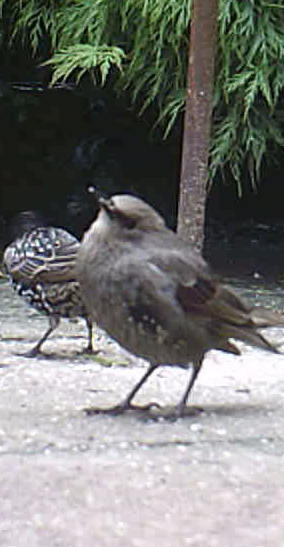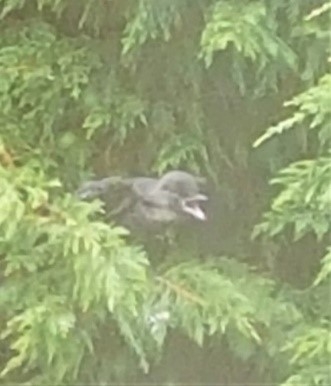Summer brought new beginnings to the garden, and all the visiting birds seem to have succeeded in fledging their young. It’s been fascinating to watch newly fledged birds in their first weeks outside the nest while attentive parent birds hurry to fill the gaping mouths of their fluffy, often dowdy offspring. The five blue tit fledglings were the exception and not dowdy at all. It was a joy to watch their vibrant adult plumage develop.
A jackdaw nursery

Juvenile starling by David Merry
Watching the birds in the garden did not prepare me for the exceptional thing that happened in early July. I was woken one morning by the loud calls of ‘tchak, tchak’, which seemed to have more urgency than usual. Jackdaws!
Jackdaws are very vocal birds at the best of times, but this noise was different. The local jackdaw flock was fledging their young on a neighbouring field, and it was an astonishing sight. These birds have always fascinated me, but the size of this flock was truly amazing: between 75 – 100 birds. I could clearly see family groups, with both parents briskly gathering food for the newly fledged young. I shouldn’t have been surprised by this behaviour, as every year I see starlings fledge their young in small parties of local birds, but nothing on this scale.
Youngsters followed behind their parents, sometimes getting lost and joining other family groups. Over the next four days, as I watched, I didn’t see any disputes or fights amongst this jackdaw nursery. It was a myriad of loud and persistent calls for more food, the young closely following the adult birds and watching keenly as they had their first lessons in foraging and the many other tricks that jackdaws use to obtain food. Then, on the fourth day, the flock began to disperse.

Young jackdaw by David Merry
Jackdaws are highly social birds and live in loose communal colonies. They feed together, breed together, fly and roost together. Jackdaws mate for life and form lifelong partnerships within flocks that have strict and settled pecking orders. Even to my untrained eye, I could see the flock working together and I observed them driving away magpies that tried to alight within the feeding flock. When gulls landed on the field the flock moved a safe distance away.
In watching flocks of jackdaws you can easily spot the mated pairs flying together, and family groups during the fledging period. Konrad Lorenz, a zoologist and animal behaviourist, described how during fledging, adult birds slow their flight to allow the young to follow.
I noticed fledglings crash-landing on roofs and one alighted on our fir tree, struggling to find a steady perch, then demanded more food with hungry cries.
Just a few days ago a small juvenile jackdaw landed on our bird feeder, easily manoeuvring onto the small cage holding the suet balls, before helping itself to a large portion. I had to smile, in such a short time this juvenile had gained another sure and steady skill - what a wonder!
The jackdaw nursey ended on the sixth day when shots rang out. Somebody was firing shots to scare off what they must consider to be noisy, messy and anti-social birds! The next day, the smaller local flock of about 30 birds returned to what they must consider a good feeding ground.

